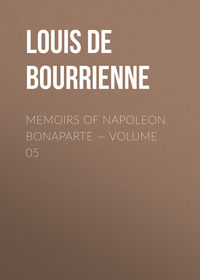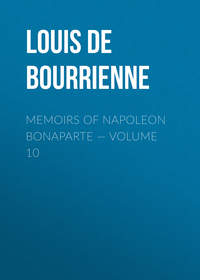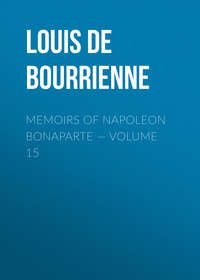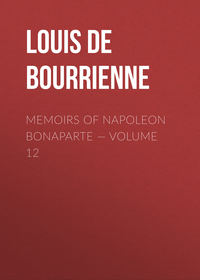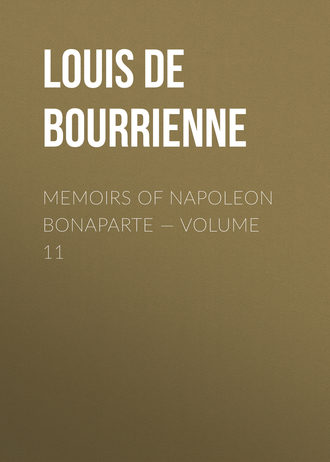 полная версия
полная версияMemoirs of Napoleon Bonaparte — Volume 11
The commencement of 1811 was sufficiently favourable to the French arms in Spain, but towards the beginning of March the aspect of affairs changed. The Duke of Belluno, notwithstanding the valour of his troops, was unsuccessful at Chiclana; and from that day the French army could not make head against the combined forces of England and Portugal. Even Massena, notwithstanding the title of Prince of Eslingen (or Essling), which he had won under the walls of Vienna, was no longer "the favourite child of victory" as he had been at Zurich.
Having mentioned Massena I may observe that he did not favour the change of the French Government on the foundation of the Empire. Massena loved two things, glory and money; but as to what is termed honours, he only valued those which resulted from the command of an army; and his recollections all bound him to the Republic, because the Republic recalled to his mind the most brilliant and glorious events of his military career. He was, besides, among the number of the Marshals who wished to see a limit put to the ambition of Bonaparte; and he had assuredly done enough, since the commencement of the wars of the Republic, to be permitted to enjoy some repose, which his health at that period required. What could he achieve against the English in Portugal? The combined forces of England and Portugal daily augmented, while ours diminished. No efforts were spared by England to gain a superiority in the great struggle in which she was engaged; as her money was lavished profusely, her troops paid well wherever they went, and were abundantly supplied with ammunition and provisions: the French army was compelled, though far from possessing such ample means, to purchase at the same high rate, in order to keep the natives from joining the English party. But even this did not prevent numerous partial insurrections in different places, which rendered all communication with France extremely difficult. Armed bands continually carried off our dispersed soldiers; and the presence of the British troops, supported by the money they spent in the country, excited the inhabitants against us; for it is impossible to suppose that, unsupported by the English, Portugal could have held out a single moment against France. But battles, bad weather, and even want, had so reduced the French force that it was absolutely necessary our troops should repose when their enterprises could lead to no results. In this state of things Massena was recalled, because his health was so materially injured as to render it impossible for him to exert sufficient activity to restore the army to a respectable footing.
Under these circumstances Bonaparte sent Bertrand into Illyria to take the place of Marmont, who was ordered in his turn to relieve Massena and take command of the French army in Portugal Marmont on assuming the command found the troops in a deplorable state. The difficulty of procuring provisions was extreme, and the means he was compelled to employ for that purpose greatly heightened the evil, at the same time insubordination and want of discipline prevailed to such an alarming degree that it would be as difficult as painful to depict the situation of our army at this period, Marmont, by his steady conduct, fortunately succeeded in correcting the disorders which prevailed, and very soon found himself at the head of a well-organised army, amounting to 30,000 infantry, with forty pieces of artillery, but he had only a very small body of cavalry, and those ill-mounted.
Affairs in Spain at the commencement of 1811 exhibited an aspect not very different from those of Portugal. At first we were uniformly successful, but our advantages were so dearly purchased that the ultimate issue of this struggle might easily have been foreseen, because when a people fight for their homes and their liberties the invading army must gradually diminish, while at the same time the armed population, emboldened by success, increases in a still more marked progression. Insurrection was now regarded by the Spaniards as a holy and sacred duty, to which the recent meetings of the Cortes in the Isle of Leon had given, as it were, a legitimate character, since Spain found again, in the remembrance of her ancient privileges, at least the shadow of a Government—a centre around which the defenders of the soil of the Peninsula could rally.
—[Lord Wellington gave Massena a beating at Fuentes d'Onore on the 5th of May 1811. It was soon after this battle that Napoleon sent Marmont to succeed Massena. Advancing on the southern frontier of Portugal the skillful Soult contrived to take Badajoz from a wavering Spanish garrison. About this time, however, General Graham, with his British corps, sallied out of Cadiz, and beat the French on the heights of Barrosa, which lie in front of Cadiz, which city the French were then besieging. Encouraged by the successes of our regular armies, the Spanish Guerillas became more and more numerous and daring. By the end of 1811 Joseph Bonaparte found so many thorns in his usurped crown that he implored his brother to put it on some other head. Napoleon would not then listen to his prayer. In the course of 1811 a plan was laid for liberating Ferdinand from his prison in France and placing him at the head of affairs in Spain, but was detected by the emissaries of Bonaparte's police. Ferdinand's sister, the ex-Queen of Etruria, had also planned an escape to England. Her agents were betrayed, tried by a military commission, and shot—the Princess herself was condemned to close confinement in a Roman convent.—Editor of 1836 edition.]—
The Continental system was the cause, if not of the eventual fall, at least of the rapid fall of Napoleon. This cannot be doubted if we consider for a moment the brilliant situation of the Empire in 1811, and the effect simultaneously produced throughout Europe by that system, which undermined the most powerful throne which ever existed. It was the Continental system that Napoleon upheld in Spain, for he had persuaded himself that this system, rigorously enforced, would strike a death blow to the commerce of England; and Duroc besides informed me of a circumstance which is of great weight in this question. Napoleon one day said to him, "I am no longer anxious that Joseph should be King of Spain; and he himself is indifferent about it. I would give the crown to the first comer who would shut his ports against the English."
Murat had come to Paris on the occasion of the Empress' accouchement, and I saw him several times during his stay, for we had always been on the best terms; and I must do him the justice to say that he never assumed the King but to his courtiers, and those who had known him only as a monarch. Eight or ten days after the birth of the King of Rome, as I was one morning walking in the Champs Elysees, I met Murat. He was alone, and dressed in a long blue overcoat. We were exactly opposite the gardens of his sister-in-law, the Princess Borghese. "Well, Bourrienne," said Murat, after we had exchanged the usual courtesies, "well, what are you about now?" I informed him how I had been treated by Napoleon, who, that I might not be in Hamburg when the decree of union arrived there, had recalled me to Paris under a show of confidence. I think I still see the handsome and expressive countenance of Joachim when, having addressed him by the titles of Sire and Your Majesty, he said to me, "Pshaw! Bourrienne, are we not old comrades? The Emperor has treated you unjustly; and to whom has he not been unjust? His displeasure is preferable to his favour, which costs so dear! He says that he made us Kings; but did we not make him an Emperor? To you, my friend, whom I have known long and intimately, I can make my profession of faith. My sword, my blood, my life belong to the Emperor. When he calls me to the field to combat his enemies and the enemies of France I am no longer a King, I resume the rank of a Marshal of the Empire; but let him require no more. At Naples I will be King of Naples, and I will not sacrifice to his false calculations the life, the well-being, and the interests of my subjects. Let him not imagine that he can treat me as he has treated Louis! For I am ready to defend, even against him, if it must be so, the rights of the people over whom he has appointed me to rule. Am I then an advance-guard King?" These last words appeared to me peculiarly appropriate in the mouth of Murat, who had always served in the advance- guard of our armies, and I thought expressed in a very happy manner the similarity of his situation as a king and a soldier.
I walked with Murat about half an hour. In the course of our conversation he informed me that his greatest cause of complaint against the Emperor was his having first put him forward and then abandoned him. "Before I arrived in Naples," continued he, "it was intimated to me that there was a design of assassinating me. What did I do? I entered that city alone, in full daylight, in an open carriage, for I would rather have been assassinated at once than have lived in the constant fear of being so. I afterwards made a descent on the Isle of Capri, which succeeded. I attempted one against Sicily, and am curtain it would have also been successful had the Emperor fulfilled his promise of sending the Toulon fleet to second my operations; but he issued contrary orders: he enacted Mazarin, and unshed me to play the part of the adventurous Duke of Guise. But I see through his designs. Now that he has a son, on whom he has bestowed the title of King of Rome, he merely wishes the crown of Naples to be considered as a deposit in my hands. He regards Naples as a future annexation to the Kingdom of Rome, to which I foresee it is his design to unite the whole of Italy. But let him not urge me too far, for I will oppose him, and conquer, or perish in the attempt, sword in hand."
I had the discretion not to inform Murat how correctly he had divined the plans of the Emperor and his projects as to Italy, but in regard to the Continental system, which, perhaps, the reader will be inclined to call my great stalking-horse, I spoke of it as I had done to the Prince of Sweden, and I perceived that he was fully disposed to follow my advice, as experience has sufficiently proved. It was in fact the Continental system which separated the interests of Murat from those of the Emperor, and which compelled the new King of Naples to form alliances amongst the Princes at war with France. Different opinions have been entertained on this Subject; mine is, that the Marshal of the Empire was wrong, but the King of Naples right.
The Princes and Dukes of the Empire must pardon me for so often designating them by their Republican names. The Marshals set less value on their titles of nobility than the Dukes and Counts selected from among the civilians. Of all the sons of the Republic Regnault de St. Jean d'Angely was the most gratified at being a Count, whilst, among the fathers of the Revolution no one could regard with greater disdain than Fouche his title of Duke of Otranto; he congratulated himself upon its possession only once, and that was after the fall of the Empire.
I have expressed my dislike of Fouche; and the reason of that feeling was, that I could not endure his system of making the police a government within a government. He had left Paris before my return thither, but I had frequent occasion to speak of that famous personage to Savary, whom, for the reason above assigned, I do not always term Duc de Rovigo. Savary knew better than any one the fallacious measures of Fouche's administration, since he was his successor. Fouche, under pretence of encouraging men of letters, though well aware that the Emperor was hostile to them, intended only to bring them into contempt by making them write verses at command. It was easily seen that Napoleon nourished a profound dislike of literary men, though we must not conclude that he wished the public to be aware of that dislike. Those, besides, who devoted their pens to blazon his glory and his power were sure to be received by him with distinction. On the other hand, as Charlemagne and Louis XIV. owed a portion of the splendour of their reigns to the lustre reflected on them by literature, he wished to appear to patronise authors, provided that they never discussed questions relating to philosophy, the independence of mankind, and civil and political rights. With regard to men of science it was wholly different; those he held in real estimation; but men of letters, properly so called, were considered by him merely as a sprig in his Imperial crown.
The marriage of the Emperor with an Archduchess of Austria had set all the Court poets to work, and in this contest of praise and flattery it must be confessed that the false gods were vanquished by the true God; for, in spite of their fulsome verses, not one of the disciples of Apollo could exceed the extravagance of the Bishops in their pastoral letters. At a time when so many were striving to force themselves into notice there still existed a feeling of esteem in the public mind for men of superior talent who remained independent amidst the general corruption; such was M. Lemercier, such was M. de Chateaubriand. I was in Paris in the spring of 1811, at the period of Chenier's death, when the numerous friends whom Chateaubriand possessed in the second class of the Institute looked to him as the successor of Chenier. This was more than a mere literary question, not only on account of the high literary reputation M. de Chateaubriand already possessed, but of the recollection of his noble conduct at the period of Duc d'Enghien's death, which was yet fresh in the memory of every one; and, besides, no person could be ignorant of the immeasurable difference of opinion between Chenier and M. de Chateaubriand.
M. de Chateaubriand obtained a great majority of votes, and was elected a Member of the Institute. This opened a wide field for conjecture in Paris. Every one was anxious to see how the author of the Genie du Christianisme, the faithful defender of the Bourbons, would bend his eloquence to pronounce the eulogium of a regicide. The time for the admission of the new Member of the Institute arrived, but in his discourse, copies of which were circulated in Paris, he had ventured to allude to the death of Louis XVI., and to raise his voice against the regicides. This did not displease Napoleon; but M. de Chateaubriand also made a profession of faith in favour of liberty, which, he said, found refuge amongst men of letters when banished from the politic body. This was great boldness for the time; for though Bonaparte was secretly gratified at seeing the judges of Louis XVI. scourged by an heroic pen, yet those men held the highest situations under the Government. Cambaceres filled the second place in the Empire, although at a great distance from the first; Merlin de Douai was also in power; and it is known how much liberty was stifled and hidden beneath the dazzling illusion of what is termed glory. A commission was named to examine the discourse of Chateaubriand. MM. Suard, de Segur, de Fontanes, and two or three other members of the same class of the Institute whose names I cannot recollect, were of opinion that the discourse should be read; but it was opposed by the majority.
When Napoleon was informed of what had passed he demanded a sight of the address, which was presented to him by M. Daru. After having perused it he exclaimed; "Had this discourse been delivered I would have shut the gates of the Institute, and thrown M. de Chateaubriand into a dungeon for life." The storm long raged; at length means of conciliation were tried. The Emperor required M. de Chateaubriand to prepare another discourse, which the latter refused to do, in spite of every menace. Madame Gay applied to Madame Regnault de St. Jean d'Angely, who interested her husband in favour of the author of the Genie du Christianisme. M. de Montalivet and Savary also acted on this occasion in the most praiseworthy manner, and succeeded in appeasing the first transports of the Emperor's rage. But the name of Chateaubriand constantly called to mind the circumstances which had occasioned him to give in his resignation; and, besides, Napoleon had another complaint against him. He had published in the 'Merceure' an article on a work of M. Alexandre de Laborde. In that article, which was eagerly read in Paris, and which caused the suppression of the 'Merceure', occurred the famous phrase which has been since so often repeated: "In vain a Nero triumphs: Tacitus is already born in his Empire." This quotation leads me to repeat an observation, which, I believe, I have already made, viz. that it is a manifest misconception to compare Bonaparte to Nero. Napoleon's ambition might blind his vision to political crimes, but in private life no man could evince less disposition to cruelty or bloodshed. A proof that he bore little resemblance to Nero is that his anger against the author of the article in question vented itself in mere words. "What!" exclaimed he, "does Chateaubriand think I am a fool, and that I do not know what he means? If he goes on this way I will have him sabred on the steps of the Tuileries." This language is quite characteristic of Bonaparte, but it was uttered in the first ebullition of his wrath. Napoleon merely threatened, but Nero would have made good his threat; and in such a case there is surely some difference between words and deeds.
The discourse of M. de Chateaubriand revived Napoleon's former enmity against him; he received an order to quit Paris: M. Daru returned to him the manuscript of his discourse, which had been read by Bonaparte, who cancelled some passages with a pencil. We can be sure that the phrase about liberty was not one of those spared by the Imperial pencil. However that may be, written copies were circulated with text altered and abbreviated; and I have even been told that a printed edition appeared, but I have never seen any copies; and as I do not find the discourse in the works of M. de Chateaubriand I have reason to believe that the author has not yet wished to publish it.
Such were the principal circumstances attending the nomination of Chateaubriand to the Institute. I shall not relate some others which occurred on a previous occasion, viz. on the election of an old and worthy visitor at Malmaison, M. Lemercier, and which will serve to show one of those strange inconsistencies so frequent in the character of Napoleon.
After the foundation of the Empire M. Lemercier ceased to present himself at the Tuileries, St. Cloud, or at Malmaison, though he was often seen in the salons of Madame Bonaparte while she yet hoped not to become a Queen. Two places were vacant at once in the second class of the Institute, which still contained a party favourable to liberty. This party, finding it impossible to influence the nomination of both members, contented itself with naming one, it being the mutual condition, in return for favouring the Government candidate, that the Government party should not oppose the choice of the liberals. The liberal party selected M. Lemercier, but as they knew his former connection with Bonaparte had been broken off they wished first to ascertain that he would do nothing to commit their choice. Chenier was empowered to inquire whether M. Lemercier would refuse to accompany them to the Tuileries when they repaired thither in a body, and whether, on his election, he would comply with the usual ceremony of being presented to the Emperor. M. Lemercier replied that he would do nothing contrary to the customs and usages of the body to which he might belong: he was accordingly elected. The Government candidate was M. Esmenard, who was also elected. The two new members were presented to the Emperor on the same day. On this occasion upwards of 400 persons were present in the salon, from one of whom I received these details. When the Emperor saw M. Lemercier, for whom he had long pretended great friendship, he said to him in a kind tone, "Well, Lemercier, you are now installed." Lemercier respectfully bowed to the Emperor; but without uttering a word of reply. Napoleon was mortified at this silence, but without saying anything more to Lemercier he turned to Esmenard, the member who should have been most acceptable to him, and vented upon him the whole weight of his indignation in a manner equally unfeeling and unjust. "Well, Esmenard," said he, "do you still hold your place in the police?" These words were spoken in so loud a tone as to be heard by all present; and it was doubtless this cruel and ambiguous speech which furnished the enemies of Esmenard with arms to attack his reputation as a man of honour, and to give an appearance of disgrace to those functions which he exercised with so much zeal and ability.
When, at the commencement of 1811, I left Paris I had ceased to delude myself respecting the brilliant career which seemed opening before me during the Consulate. I clearly perceived that since Bonaparte, instead of receiving me as I expected, had refused to see me at all, the calumnies of my enemies were triumphant, and that I had nothing to hope for from an absolute ruler, whose past injustice rendered him the more unjust. He now possessed what he had so long and ardently wished for, —a son of his own, an inheritor of his name, his power, and his throne. I must take this opportunity of stating that the malevolent and infamous rumours spread abroad respecting the birth of the King of Rome were wholly without foundation. My friend Corvisart, who did not for a single instant leave Maria Louisa during her long and painful labour, removed from my mind every doubt on the subject. It is as true that the young Prince, for whom the Emperor of Austria stood sponsor at the font, was the son of Napoleon and the Archduchess Maria Louisa as it is false that Bonaparte was the father of the first child of Hortense. The birth of the son of Napoleon was hailed with general enthusiasm. The Emperor was at the height of his power from the period of the birth of his son until the reverse he experienced after the battle of the Moskowa. The Empire, including the States possessed by the Imperial family, contained nearly 57,000,000 of inhabitants; but the period was fast approaching when this power, unparalleled in modern times, was to collapse under its own weight.
—[The little King of Rome, Napoleon Francis Bonaparte, was born on the 20th of March 1811. Editor of 1836 edition.]—
CHAPTER XXVI
My return to Hamburg—Government Committee established there— Anecdote of the Comte de Chaban—Napoleon's misunderstanding with the Pope—Cardinal Fesch—Convention of a Council—Declaration required from the Bishops—Spain in 1811—Certainty of war with Russia—Lauriston supersedes Caulaincourt at St. Petersburg—The war in Spain neglected—Troops of all nations at the disposal of Bonaparte—Levy of the National Guard—Treaties with Prussia and Austria—Capitulation renewed with Switzerland—Intrigues with Czernischeff—Attacks of my enemies—Memorial to the Emperor—Ogier de la Saussaye and the mysterious box—Removal of the Pope to Fontainebleau—Anecdote of His Holiness and M. Denon—Departure of Napoleon and Maria Louisa for Dresden—Situation of affairs in Spain and Portugal—Rapp's account of the Emperor's journey to Dantzic— Mutual wish for war on the part of Napoleon and Alexander—Sweden and Turkey—Napoleon's vain attempt to detach Sweden from her alliance with Russia.
As I took the most lively interest in all that concerned the Hanse Towns, my first care on returning to Hamburg was to collect information from the most respectable sources concerning the influential members of the new Government. Davoust was at its head. On his arrival he had established in the Duchy of Mecklenburg, in Swedish Pomerania, and in Stralsund, the capital of that province, military posts and custom-houses, and that in a time of profound peace with those countries, and without any previous declaration. The omnipotence of Napoleon, and the terror inspired by the name of Davoust, overcame all obstacles which might have opposed those iniquitous usurpations. The weak were forced to yield to the strong.
At Hamburg a Government Committee was formed, consisting of the Prince of Eekmuhl as President, Comte de Chaban, Councillor of State, who superintended the departments of the Interior and Finance, and of M. Faure, Councillor of State, who was appointed to form and regulate the Courts of Law. I had sometimes met M. de Chaban at Malmaison. He was distantly related to Josephine, and had formerly been an officer in the French Guards. He was compelled to emigrate, having been subjected to every species of persecution during the Revolution.



